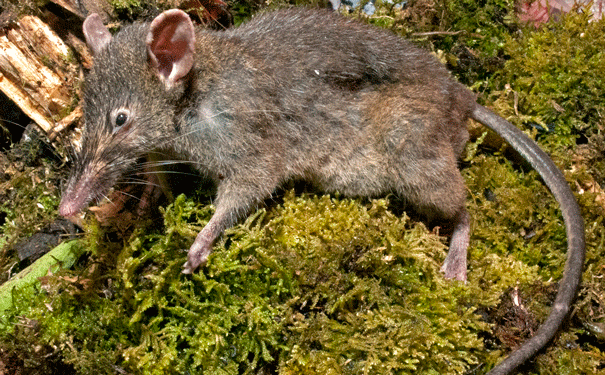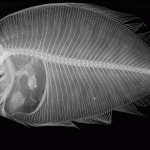
Holotype of P. vermidax. Image: Biology Letters
This rat has given up gnawing for sucking on earthworms.
Rodents can be found thriving and playing an important role in virtually every terrestrial ecosystem, for example as seed dispersers or soil engineers. The secret of their success lies in their teeth — the gnawing incisors and grinding molars, as well as diastema that spatially and functionally separates the two.
Until now, these traits have been observed in all rodents — the name Rodentia is actually derived from the Latin words rodere (gnaw) and dentis (tooth). So it came as a surprise when an international team of scientists found a new species of shrew-rat in the rainforests of Sulawesi, Indonesia, and revealed it has lost all of its molars.
The new species, Paucidentomys vermidax, only has its front four teeth, but these are has bicsupid upper incisors, rather than gnawing incisors — a unique feature among the more-than-2200 known species of rodents. This discovery broadens the definition of rodents, according to Dr Jacob Esselstyn from Canada’s McMaster University. “Paucidentomys is clearly a rodent, but it doesn’t have all the features we traditionally use to define rodents, such as gnawing incisors and grinding molars,” he says.
However, it wasn’t bad dental health that caused P. vermidax to lose its molars. An examination of the stomach contents showed that the rat had only been eating earthworms. Esselstyn and his colleagues suggested in the study, published in Biology Letters, that the incisors probably help the shrew-rats tear or cut their prey before they swallow it.
P. vermidax’s long face and lack of chewing teeth also indicated that it was a specialist vermivore. “We posit that by specialising on soft-bodied prey, this species has had no need to process food by chewing, allowing its dentition to evolve for the sole purpose of procuring food,” the researchers stated in the study.
The discovery shows how the process of evolution can lead to the reversal of successful traits when a species is confronted with a new situation, enabling it to exploit new resources. “Paucidentomys probably started losing its molars when it quit chewing its food. Natural selection will gradually eliminate unnecessary characters over many generations if they are expensive to maintain,” Esselstyn explains.
“If they can obtain sufficient nutrients and energy without chewing their food, then there’s no need to expend energy growing molars.”






